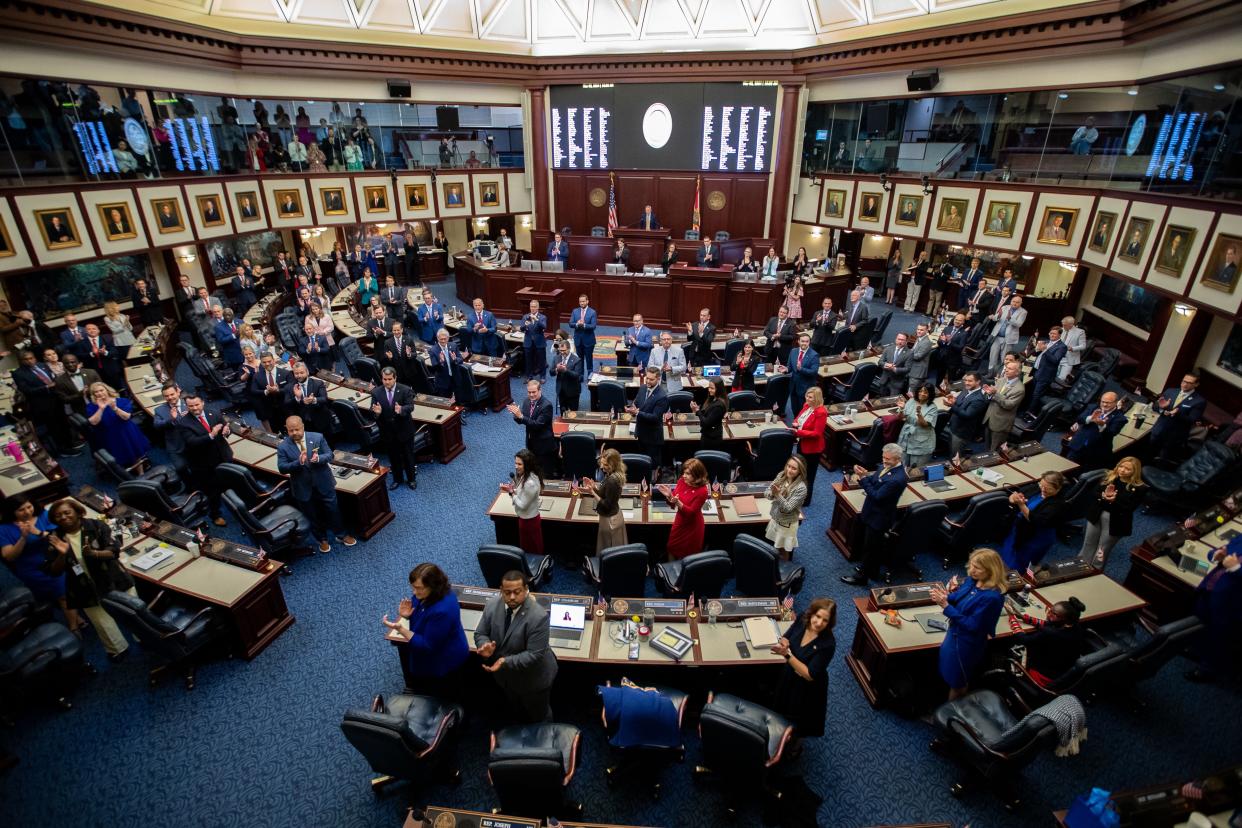Jacksonville can do a sales tax for health care. What else came out of the Legislature?

The Florida legislative session came to a close Friday, bringing with it a slew of bills with significant impacts statewide and in Jacksonville.
Though some particularly controversial bills died in committee — with the potential to return next session — a number beat the clock for passage in the last days of the session.
The legislation covers a potential Duval County sales tax for health care, a higher minimum age for strip club performers that Jacksonville has also pushed, changes to ethics investigations that Jacksonville officials fought, and limits on citizen review boards for police that has been a matter of intense debate here for years, and an an increase in the sheriff's budget power.
Two possible legislative changes got partly to the finish line but fell short for Confederate monuments and the city's sales tax for pension debt.
More: 2024 Session: Florida lawmakers hit finish line with votes on budget and tax breaks
More: Sine die done: Here are the winners and losers of the 2024 Florida Legislative Session
More: My Safe Florida Home funding increased to $200 million. What does that mean for homeowners?
Jacksonville can enact half-cent sales tax for health care
A wide-ranging tax bill (HB 7073) opens the door for a half-cent sales tax covering health care for poor people in Duval County, but only if it that choice went before voters in a referendum.
The state currently lets counties with more than 800,000 residents enact that sales tax for indigent health care and trauma centers. Duval County was excluded, however, because it is a consolidated city-county government. A provision in the tax bill removes that restriction.
A City Council Auditor's report released in January suggested exploring a half-cent sales tax that would raise about $130 million a year. City Council President Ron Salem had directed the council auditor to examine the city's indigent care contract with UF Health Jacksonville.
One of the biggest rising costs in the city’s budget is about $40 million to reimburse UF Health Jacksonville for "safety net" medical services it gives to patients unable to pay for treatment. In addition to hospital care, a half-cent sales tax also would help people get access to regular doctor checkups, preventative care, mental health treatment and other medical services.

Duval County ranks 46th out of 67 Florida counties in health outcomes. Mayor Donna Deegan has said Duval County suffers "some of the worst maternal and infant mortality numbers not only in the state, but worse than some third-world countries, especially in our African American community, and that is absolutely unacceptable.”
No local official has called for enacting the sales tax. While Duval County could consider the tax, the Legislature eliminated the ability of levying the sales tax solely by a vote of City Council so it would require voter approval.
Confederate monument bill hits dead end second year in row
Rep. Dean Black’s, R-Jacksonville, bill (HB 395) to prevent the removal of “historic monuments” died for a second time in committee this term after Senate Republican leaders heard “bigoted” comments in support of it.
The bill would have had significant impacts if passed before Mayor Donna Deegan ordered the removal of statues from the “Women of the Southland” Confederate monument. The original bill could have ordered all monuments — including those removed by Mayor Lenny Curry — be restored to their original location.
The retroactive nature of the bill was taken out of the final version, but Gov. Ron DeSantis still could have had the option to remove elected officials from office if they ordered the alteration or removal of a “historic” structure under the bill.

The bill would have applied to all memorials and monuments dedicated to a "historic person, entity, event or series of events and which honors or recounts the military service of any past or present military personnel, or past and present public service."
Florida Senate President Kathleen Passidomo, R-Naples, said in February she expected the bill to be left without a final vote after hearing from supporters who spoke in favor of protecting “white culture” and white supremacy.
“The bill itself is benign, if you read it. It’s benign,” she said. “But it has been weaponized by both sides, and that troubles me. That’s not how we run our chamber, that’s not how we pass our legislation, at least for me. And so, at this point, I don’t see that bill coming back.”
No second referendum needed for city’s pension paydown tax
The tax bill that gives Jacksonville the option of enacting a half-cent sales tax for indigent care had another provision that kept city leaders on edge for weeks — a provision requiring another referendum in 2026 on a half-cent sales tax for paying down the city’s huge pension debt.
The House aimed to put 10-year limits on all kinds of local sales taxes and that put the pension tax backed by voters in 2016 in the mix.
State Rep. Wyman Duggan, R-Jacksonville, reached out to legislative leaders to tell them that requiring a referendum would rock the city's financial outlook, both long-term to pay for pension obligations and immediately. Even though the sales tax won't kick in until the current Better Jacksonville plan tax expires in a few years, the city benefits from a formula that counts future sales tax collection for calculating its annual pension contributions.
The city's annual contribution to just the Police and Fire Pension Fund would jump by more than $100 million next year if future sales taxes over a 30-year period couldn't be counted.

House Speaker Paul Renner told reporters Feb. 28 that lawmakers weren't targeting Jacksonville's pension tax. "I can definitely say it was absolutely not written with Jacksonville in mind," he said.
He said the pension tax is different from other sales taxes. Lawmakers looked at eliminating impact on the pension tax as House and Senate lawmakers met to bridge their differences on the tax bill. By the final version of the bill came out of the Senate and then was voted on by the House, all the provisions requiring referendums every 10 years on sales taxes were gone.
Last-minute approval of ethics bill carries big impacts across the state
Local Ethics Commissions will no longer be able to consider anonymous complaints — a blow to the commissions that rely on the ability to protect sources.
Once thought to have died in the House, the Senate bill (SB 7014) carrying significant changes to local Ethics Commissions passed Thursday 79-34.
Ethics Commissions are the "watchdogs" of local government and, prior to the law taking effect, could investigate an anonymous complaint or a complaint from someone with indirect knowledge of the matter. Under the new law, either option would be considered “hearsay” and is not considered “fair” to the government office or official under scrutiny.
In Jacksonville, an investigation once began simply with a note sliding under a commissioner’s door and leading to a public records search and changes to local policy, Carla Miller told the Times-Union.
Now, offices must now wait for an official complaint to be made under oath from someone with direct knowledge of the wrongdoing.
Ethics Commissions across the state, including Jacksonville, penned a letter in February asking the House to drop the changes, saying it would “dismantle” government oversight, and the Jacksonville Ethics Commission sent DeSantis a letter March 15 asking him to veto the bill.
"Local ethics commissions are a bastion against fraud and corruption in the public sector and strive to preserve the public trust," the letter said. "SB 7014 will dramatically impair anti-corruption efforts at the local government level. We urge you to veto SB 7014 and assist us in the fight against government corruption."
Council member Matt Carlucci opposed the bill before the vote and said it gutted the commissions.
“The law has been sent to the governor and short of a veto, over 40 years of hard work for good government will be gone,” Carlucci said in a statement. “I am thankful to those members of the Duval delegation who voted no.”
Civilian review boards blocked from investigating police complaints
A bill (HB 601) introduced by Duggan will have statewide impact by preventing local governments from using citizen review boards to investigate complaints against police and corrections officers.
Jacksonville is not among the 21 cities that have such boards but Deegan has said she favors creating one that will increase communication between community members and the police. Sheriff T.K. Waters has said he opposes a civilian review board.
Duggan said when he filed the bill that locally created panels lack uniform standards for doing investigations, and that adds uncertainty to what’s already a very stressful job. He said a number of local, state and federal entities still will investigate allegations of police misconduct.
After being amended in the Senate, the final version of the bill says local sheriffs and police chiefs can create citizen oversight boards to review the law enforcement agency’s policies and procedures, but not individual complaints. That puts the ball in Waters' court on whether he wants to have an oversight board along those lines.
Stripping age raised to 21
Argued as a measure against human trafficking, the House passed the bill (HB 7063) the last day of session to raise the age to strip — or work in any adult entertainment establishment including adult bookstores and movie theaters — from 18 to 21.
The measure was modeled after a Jacksonville ordinance championed by former City Council member Leanna Cumber.
“I’m really excited that we were able to spearhead it here” in Jax “It’s far better as state law rather than jurisdiction-by-jurisdiction.” I couldn’t be prouder of this legislation & look forward to it becoming state law! Thanks @Clay_Yarborough for your leadership! https://t.co/IwDVp30aGg
— LeAnna Cumber (@LeAnnaCumber) February 8, 2024
The local ordinance is currently being reviewed by the 11th U.S. Circuit Court of Appeals that will make a determination on whether the distinction constitutes an age-based regulation of expression.
The decision could carry impact locally and across the state, setting a precedent for the age-distinction or ruling against First Amendment rights.
Jacksonville sheriff gets own procurement authority
The Jacksonville sheriff will now have procurement and budget transfer authority.
Introduced by Sen. Clay Yarborough, R-Jacksonville, the bill (SB 1704) grants the sheriff power to move funds, make personnel staffing and salary changes and control the “purchase and procurement of supplies and equipment” without City Council approval. This means that once City Council approves his annual budget, he will be able to make changes without alerting the governing body.
Other Florida sheriffs already have such authority, but separation of powers in consolidated city-county governments like Jacksonville place different responsibilities on constitutional officers.
This article originally appeared on Florida Times-Union: Florida Legislature will allow sales tax for health care in Jacksonville

